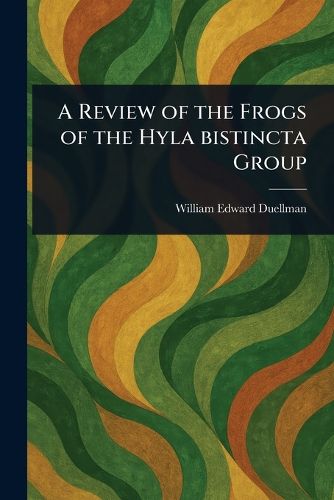Readings Newsletter
Become a Readings Member to make your shopping experience even easier.
Sign in or sign up for free!
You’re not far away from qualifying for FREE standard shipping within Australia
You’ve qualified for FREE standard shipping within Australia
The cart is loading…






This title is printed to order. This book may have been self-published. If so, we cannot guarantee the quality of the content. In the main most books will have gone through the editing process however some may not. We therefore suggest that you be aware of this before ordering this book. If in doubt check either the author or publisher’s details as we are unable to accept any returns unless they are faulty. Please contact us if you have any questions.
Dive into the fascinating world of Central American amphibians with William E. Duellman's "Review of the Frogs of the Hyla bistincta Group." This detailed zoological study provides an in-depth look at a specific group of frogs, the Hyla bistincta group, within the broader context of Central American amphibian life. A valuable resource for anyone interested in natural history, the book meticulously explores these creatures and their place in the ecosystem. Focusing on the science of herpetology and the natural world, this classic work examines these intriguing animals with precision and clarity. Ideal for both amateur naturalists and seasoned zoologists, this exploration of frogs offers a timeless perspective on these often-overlooked inhabitants of our planet.
This work has been selected by scholars as being culturally important, and is part of the knowledge base of civilization as we know it.
This work is in the public domain in the United States of America, and possibly other nations. Within the United States, you may freely copy and distribute this work, as no entity (individual or corporate) has a copyright on the body of the work.
Scholars believe, and we concur, that this work is important enough to be preserved, reproduced, and made generally available to the public. We appreciate your support of the preservation process, and thank you for being an important part of keeping this knowledge alive and relevant.
$9.00 standard shipping within Australia
FREE standard shipping within Australia for orders over $100.00
Express & International shipping calculated at checkout
This title is printed to order. This book may have been self-published. If so, we cannot guarantee the quality of the content. In the main most books will have gone through the editing process however some may not. We therefore suggest that you be aware of this before ordering this book. If in doubt check either the author or publisher’s details as we are unable to accept any returns unless they are faulty. Please contact us if you have any questions.
Dive into the fascinating world of Central American amphibians with William E. Duellman's "Review of the Frogs of the Hyla bistincta Group." This detailed zoological study provides an in-depth look at a specific group of frogs, the Hyla bistincta group, within the broader context of Central American amphibian life. A valuable resource for anyone interested in natural history, the book meticulously explores these creatures and their place in the ecosystem. Focusing on the science of herpetology and the natural world, this classic work examines these intriguing animals with precision and clarity. Ideal for both amateur naturalists and seasoned zoologists, this exploration of frogs offers a timeless perspective on these often-overlooked inhabitants of our planet.
This work has been selected by scholars as being culturally important, and is part of the knowledge base of civilization as we know it.
This work is in the public domain in the United States of America, and possibly other nations. Within the United States, you may freely copy and distribute this work, as no entity (individual or corporate) has a copyright on the body of the work.
Scholars believe, and we concur, that this work is important enough to be preserved, reproduced, and made generally available to the public. We appreciate your support of the preservation process, and thank you for being an important part of keeping this knowledge alive and relevant.